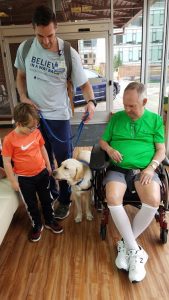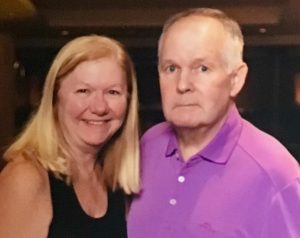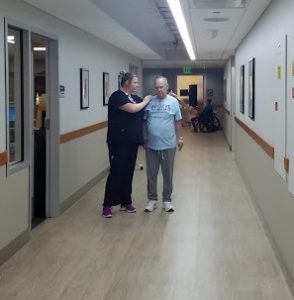
Jack Quigley with Magee’s facility dog, Nigel, and Peter DeLong, Occupational Therapist.
–Written by Melissa Katz, MS, CCC-SLP, Speech-language pathologist
As a speech-language pathologist at Magee, I have the honor of working with individuals who have had strokes and brain injuries. It is hard to describe, but it is almost surreal to see someone learn how to walk, talk, eat, and take care of themselves again. I also have the opportunity to work with the patient’s family including spouses, parents, and children. While in the hospital, the main focus is usually on the patient, but we cannot forget how the traumatic event also impacts the lives of loved ones. It is crucial to provide them support as well.
I met Betsy Quigley in the spring of 2019 when her husband Jack was undergoing rehabilitation following a stroke. I continue to admire her for her patience and tenacity throughout his recovery.
Melissa Katz (MK): Tell us a bit about yourself and your husband Jack.
Betsy Quigley (BQ): Jack and I have been married 42 years. We were in the first grade together and ended up as high school sweethearts. We raised our two boys in the same house in the Logan Square neighborhood where my grandmother raised my mom and her brothers. Jack was a driver for the Philadelphia Daily News and eventually became the Secretary-Treasurer of his Teamster Union. I was the Office Manager for the Office of Chief Counsel, IRS. After retiring, we enjoyed walking in town and traveled quite a bit. In fact, we were scheduled to take a cruise at the end of May, but on May 4, 2019, our world changed when Jack suffered a stroke.
MK: What was it like at the beginning of Jack’s recovery versus when he left Magee?

Betsy & Jack Quigley
BQ: Jack’s stroke was caused by a brain bleed. Upon being accepted at Magee, he could not walk, move his right arm and his speech was very slurred. Seeing Jack so helpless was overwhelming. Those first few weeks at Magee I would accompany him to therapy but most times I would leave in tears. I knew Magee’s motto was BELIEVE, but I was certainly an UNBELIEVER at the time. Finally, one of Jack’s therapist suggested that I stay away from therapy for two weeks. I took that advice and that UNBELIEVER became a BELIEVER. Together we, and I include Jack’s team, celebrated every small step and worked harder with every set back. Magee made arrangements for us to participate in the Peer Mentor Program which was extremely beneficial. During Jack’s last week as an inpatient at Magee I got to do more “hands on” training with him, including a community outing trip to the park. That gave both of us the confidence that Jack could enjoy an independent life at home again.
MK: How did you cope while Jack was recovering?
BQ: During the two weeks I did not go to therapy with Jack, it gave me the time to take long walks along the Kelly and Martin Luther King Drive. I relied a lot on my faith and it was during these walks I would say a Rosary and ask for strength. I started preparing our home in the event Jack would not be able to climb the steps. I started eating healthier and my blood pressure and sugar levels came down which gave me so much more energy. Once I got home at night, I would post updates on Facebook to our family and friends. The support I got from them was so uplifting.
MK: What are you and Jack up to now at home?

Jack practices walking with assistance from Magee OT Mandi Parker during his inpatient stay.
BQ: We continue to go to outpatient therapy at Magee Riverfront where Jack continues to work hard and improve. It is almost like a reunion. I made a promise to Jack that if he worked hard we would go on that cruise. We sailed to Bermuda on September 1st and Jack did incredibly well despite some rough waters from Hurricane Dorian.
MK: What advice would you give to caregivers of people who have had a stroke or brain injury?
BQ: That is a hard question. I would say accept all help offered, focus on what you are able to provide, set realistic goals and take care of your own health needs. I often reflect on what Bernice Johnson Reagon (song leader, composer, scholar, and social activist) wrote: “Life’s challenges are not supposed to paralyze you, they’re supposed to help you discover who you are.”
Find Support
Magee offers peer mentor programs and support groups for many of our patients. Mentors are available with various life experiences, types of injury or disability, and backgrounds.
A support group is a place to learn about the resources available to you. Members help each other by sharing ideas and practical solutions to problems that you face daily. Rehabilitation professionals from Magee Rehabilitation bring to the group expertise in supporting an individual or care giver in accessing available community resources.
Click here to learn more about Magee’s support group and peer mentor program.




